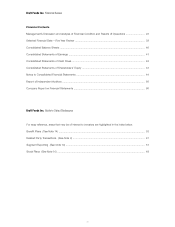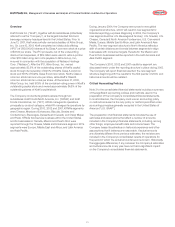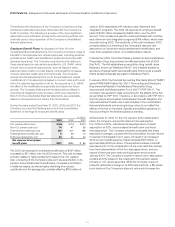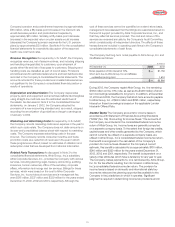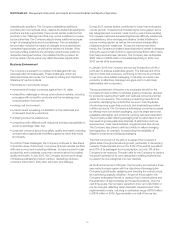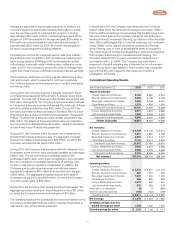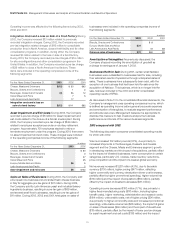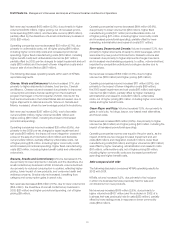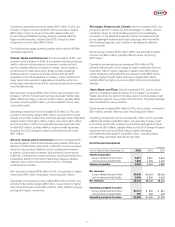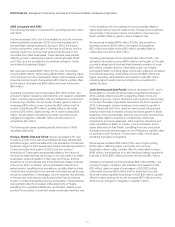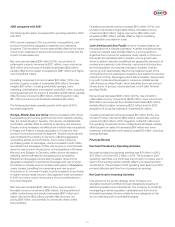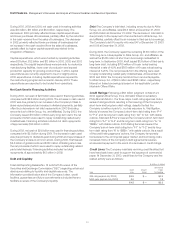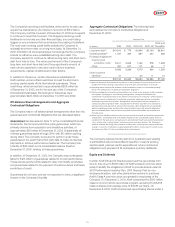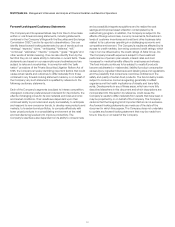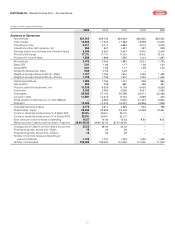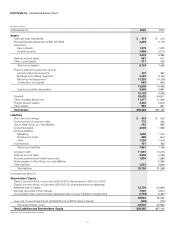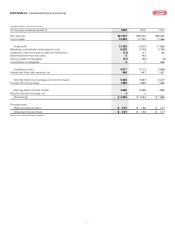Kraft 2003 Annual Report Download - page 34
Download and view the complete annual report
Please find page 34 of the 2003 Kraft annual report below. You can navigate through the pages in the report by either clicking on the pages listed below, or by using the keyword search tool below to find specific information within the annual report.
Kraft Foods Inc. Management’s Discussion and Analysis of Financial Condition and Results of Operations
2003 compared with 2002
The following discussion compares KFI’s operating results for 2003
with 2002.
Volume decreased 1.6%, due to the divestiture of a Latin American
bakery ingredients business in 2002 and a rice business and a
branded fresh cheese business in Europe in 2003, the impact
of price competition, particularly in Germany and France, and the
adverse impact of a summer heat wave across Europe on the
chocolate and coffee businesses. These declines were partially
offset by growth in developing markets, including Russia, Brazil
and China, and the acquisitions of a snacks business in Turkey
and a biscuits business in Egypt.
Net revenues increased $865 million (10.5%), due to favorable
currency ($610 million), higher pricing ($320 million, reflecting higher
commodity and currency devaluation-driven cost increases in Latin
America) and the impact of acquisitions ($57 million), partially offset
by the impact of divestitures ($66 million) and lower volume/mix
($56 million).
Operating companies income decreased $48 million (3.6%), due
primarily to higher marketing, administration and research costs ($98
million, including higher benefit costs and infrastructure investment
in developing markets), the net impact of lower gains on sales of
businesses ($41 million), lower volume/mix ($29 million) and the
impact of divestitures ($13 million), partially offset by favorable
currency ($72 million), higher pricing, net of cost increases ($36
million, including fixed manufacturing costs), the 2002 pre-tax
charges for integration costs ($17 million) and the impact of
acquisitions ($7 million).
The following discusses operating results within each of KFI’s
reportable segments.
Europe, Middle East and Africa: Volume increased 0.3%, due
to volume growth in the Central and Eastern Europe, Middle East
and Africa region, which benefited from the acquisition of a biscuits
business in Egypt in 2003 as well as a snacks business acquisition in
Turkey during the third quarter of 2002, and new product
introductions. These gains were partially offset by the impact of
the summer heat wave across Europe on the chocolate and coffee
businesses, price competition in Germany and France, and the
divestiture of a rice business and a branded fresh cheese business
in Europe in 2003. In snacks, volume increased in biscuits and
salted snacks, benefiting from acquisitions, partially offset by lower
confectionery volume due to the summer heat wave across Europe
and price competition. In beverages, volume declined, due primarily
to the summer heat wave across Europe (which had an adverse
impact on coffee shipments) and price competition. These declines
were partially offset by increased coffee shipments in Russia,
benefiting from expanded distribution, and Poland, aided by new
product introductions. Convenient meals volume also declined, due
to the divestiture of a rice business in Europe, partially offset by
higher shipments of canned meats in Italy. Cheese volume declined,
due primarily to the impact of price competition in Germany and
Spain, partially offset by gains in cream cheese in Italy.
Net revenues increased $842 million (13.6%), due primarily to
favorable currency ($808 million), the impact of acquisitions
($57 million) and higher pricing ($18 million), partially offset by
unfavorable volume/mix ($43 million).
Operating companies income increased $50 million (5.2%), due
primarily to favorable currency ($100 million) and the gain on the sale
of a rice business and a branded fresh cheese business in Europe
($31 million), partially offset by unfavorable costs, net of higher
pricing ($39 million, including higher commodity costs and increased
promotional spending), unfavorable volume/mix ($28 million) and
higher marketing, administration and research costs ($17 million,
including higher benefit costs and infrastructure investment in
eastern Europe).
Latin America and Asia Pacific: Volume decreased 4.4%, due to
the divestiture of a Latin American bakery ingredients business in
2002, partially offset by growth in Argentina, Brazil, China and
Australia. In grocery, volume declined in Latin America, due primarily
to the sale of a bakery ingredients business in the fourth quarter of
2002. In beverages, volume increased, due primarily to growth in
Brazil, Venezuela and China, aided by new product introductions.
Snacks volume also increased, as biscuits volume growth in Brazil,
Argentina, China and Australia, aided by new product introductions,
was partially offset by a decline in confectionery, which was
impacted by economic weakness, trade inventory reductions and
price competition in Brazil. In cheese, volume increased, due to
higher shipments in Asia Pacific, benefiting from new products in
Australia and promotional programs in the Philippines, partially offset
by declines in Latin America. In convenient meals, volume grew,
benefiting from gains in Argentina.
Net revenues increased $23 million (1.1%), due to higher pricing
($302 million, reflecting higher commodity and currency
devaluation-driven costs), partially offset by unfavorable currency
($198 million), the divestiture of a Latin American bakery ingredients
business in 2002 ($68 million) and lower volume/mix ($13 million).
Operating companies income decreased $98 million (26.6%), due
primarily to higher marketing, administration and research costs
($81 million), gains on sales of businesses in 2002 ($72 million),
unfavorable currency ($28 million) and the divestiture of a Latin
American bakery ingredients business in 2002 ($10 million), partially
offset by higher pricing, net of cost increases ($75 million) and the
2002 pre-tax charges for integration costs ($17 million).
32


